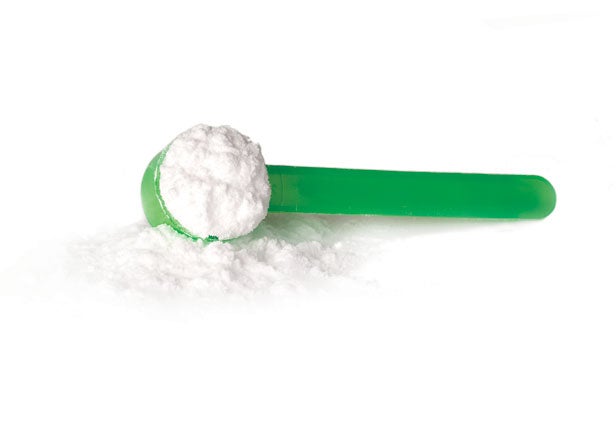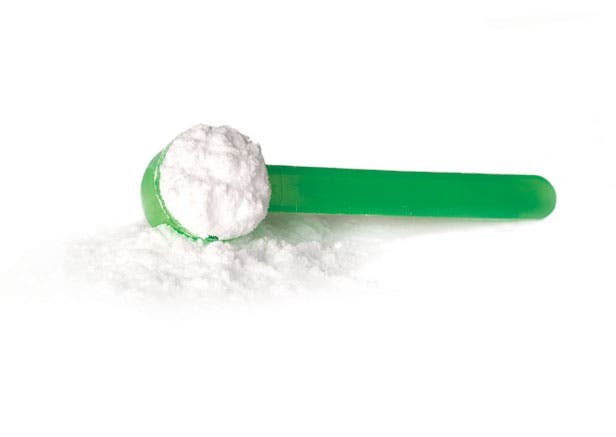Glutamine: Your Post-Sweat Supplement?


Ask 10 active women for their thoughts on glutamine and you’ll probably get a variety of comments, running the gamut from “Works like magic” to “Wasn’t for me, didn’t do much.” So how do you decide? Here, we’ll clear out the hype by explaining what it is, breaking down the unique way it works to potentially optimize muscle recovery and then delve into the latest science and get to the heart of the matter: Should you supplement your training diet with glutamine?
What Is It?
Glutamine is the most abundant amino acid in your body. It’s a part of the non-essential group of about 20 amino acids that are found naturally throughout your body. This means that your body can produce glutamine on its own from other available compounds whenever necessary. For the most part, your need for glutamine can be met with a healthy diet rich in quality protein, such as steak, poultry, fish, dairy products and beans. But glutamine’s non-essential status doesn’t mean you should snub its supplement form, because here’s the rub: Glutamine is the primary fuel source for your immune system and much of it is stored in your muscles.
Evidence shows that during intense exercise, your muscles release glutamine into the bloodstream, which can deplete glutamine reserves by as much as half. Such a shortfall can promote the breakdown and wasting of muscle tissue. Shawn Talbott, PhD, a nutritional biochemist and research director for Supplement Watch, a health education company explains: “The depletion of glutamine is very much dependent on the overall intensity of the challenge. Extremely intense catabolic conditions (such as burn patients) might deplete glutamine levels by 90 percent, while the casual exerciser would have little to no glutamine depletion. A hard-training athlete would be someplace in between 30 to 50 percent.” So the more intense your workout effort, the greater the glutamine depletion is likely to be, which is why many experts consider glutamine to be a “conditional non-essential” amino acid.
How Glutamine Works
In many ways, glutamine can be seen as a virtual jack-of-all-trades: It aids in muscle metabolism and recovery, and plays an essential role in supporting the immune system. Glutamine is able to multi-task because it is not stored in the same way fat is stored as adipose or carbs as glycogen; rather, it becomes what is needed, and mostly it is needed to build and maintain muscles.
Oxygen advisory board member Susan Kleiner, PhD, RD, explains further, “Glutamine is constantly being used and its form changes all the time. It can be a part of a cell membrane or an enzyme or a hormone – whatever the body needs – and your level of glutamine will go up and down on a daily basis according to your body’s demands.” As mentioned earlier, postworkout glutamine depletion may hinder your results since it directly affects immune and muscle response.
Research reveals that glutamine helps optimize recovery in the following four ways: Readily available glutamine can prevent muscle breakdown and prevent your body from using your muscle tissue as fuel when your body is depleted, a concept known in bodybuilding lingo as protein sparing. Glutamine spares protein by stimulating formation of glycogen, which comes from the breakdown of carbohydrates and is your body’s preferred energy source for exercise. When your body’s glycogen stores are depleted, your body may dip into your muscles to steal energy from protein – you don’t want that. In cases of extreme glycogen depletion, “Glutamine directly increases the activity of an enzyme that creates glycogen in muscle and liver cells,” says Talbott.
In a study done on cyclists, glutamine was given to subjects during a two-hour workout, which resulted in doubling the concentration of glycogen in the muscles. What’s more, glutamine is important for cellular hydration, which helps maintain cell volume and in effect, enhances protein synthesis, the process of rebuilding and repairing muscle tissues. Tom Bilella, CCN, CNS, head nutritionist for the New York Jets explains: “Glutamine gets into the cell then draws in water to volumize it. And since a hydrated cell is less likely to break down, this helps you maintain mass.”
Lastly, glutamine protects your immune system since it is the top fuel source for immune cells – and that in effect can help you build muscle. “If the immune cells don’t have enough available glutamine to do the necessary repairs, they will steal it from somewhere else,” says Talbott. “And since your body’s store of glutamine basically is your muscle, that will be the first thing broken down when the immune system needs some fuel.” A strong immune system will help your body fend off infections that can sideline training. It’s also worth noting that because of its close relationship with the immune system, glutamine supplementation has been shown to be effective when treating burn patients, cancer patients, and those with HIV/AIDS.
Glutamine’s Grey Area
As with all supplements in general, the question of whether or not glutamine is needed for active people is neither black nor white. Kleiner believes that supplementation with such a readily available nutrient is redundant for the typical athlete, stating that to date, there’s a lack of firm science favoring glutamine supplementation. “After exercise, refueling with carbs and protein is probably more significant and beneficial than supplementing with one single amino acid,” she says. And indeed, several studies support her school of thought. One done with elite wrestling athletes came up short on results when subjects were given glutamine in the hopes of retaining muscle mass while cutting weight; no significant differences between the glutamine and non-glutamine groups were evident. Another study also drew a blank when athletes were given additional glutamine hoping it would help prevent immune suppression post-exercise; it had little effect.
There could be several reasons for the failure of these recent studies to come up with any efficacy for glutamine supplementation, one of which could simply be that they were poorly designed. “Many studies take a small number of subjects, give them some capsules and a training program, and then fail to manage either the subjects or their supplements very well,” says Talbott. “The subjects forget to take their pills or miss a few training sessions, which results in a ‘no effect’ result from the study.” He also points out that the training regimen of the study participants might not have been difficult enough.
That being said, glutamine can help you retain muscle mass and enhance recovery if you’re working out hard, very hard, “Hard enough to get you into a hyper-catabolic state,” says Talbott. “If you’re not reaching that threshold, then glutamine probably won’t add much to your program.” But if you are, there are some benefits to be gained. Recall that glutamine is your immune system’s main source of energy, “So when you do a hard workout and cause some muscle damage, your immune system cells have to step up their activity,” says Talbott. Think of it this way: If you do a hard biceps workout and need to repair that muscle, the immune system will draw glutamine from somewhere else – your thigh, shoulders, or abdominal muscles – to repair the damage to the biceps if your glutamine stores are low. With that in mind, adding glutamine to a post-workout meal or shake could help boost muscle repair and recovery, sparing the body the breakdown it might incur as a result of a hard workout.
Who Can Benefit
Now that you know that glutamine is “conditionally essential” – meaning that in times of stress, heavy exercise, injury or illness, your need for glutamine increases – the question remains: who can benefit the most from using it? According to our experts, these two groups of athletes:
Contest competitors. Extreme dieting, such as a pre-contest fat-loss regimen, can lead to increased stress and protein and glutamine depletion. Since your body is continually trying to recover from strenuous exercise, it may become catabolic if your immune system isn’t up to par. Another appealing attribute to competitors is that glutamine has been shown to curb sugar cravings! “As little as 1,500 milligrams between meals can really help when you’re dieting,” says Bilella.
Endurance athletes. It’s very common for distance runners to be more susceptible to catching colds and other upper-respiratory infections than the average weightlifter. Because of this increased risk of immune suppression, these groups of women are perfect candidates for supplementation.
How To Use It
The consensus is to take glutamine postworkout when your stores are likely to be at their lowest. “Glutamine powder gives you more bang for your buck, and is easier to use than pills,” says Bilella. Glutamine pills are fairly large and a bit more expensive, while the powder is tasteless and blends easily in liquid. Mix three to six grams of glutamine with water and a quality whey protein and consume 30 to 60 minutes after training, according to Bilella. “You can also combine it with BCAAs postworkout to help decrease muscle soreness,” adds Talbott. Though no dramatic side effects have been reported, exceeding 20 grams per day could lead to gastrointestinal woes such as diarrhea. The University of Maryland Medical Center also cautions: Do not mix with hot drinks because heat destroys glutamine; people with kidney or liver disease, or undergoing cancer therapy should not take it. Because of the potential for side effects and interactions with medications, glutamine (and all dietary supplements, for that matter) should only be taken after getting a nod of approval from your doctor.
Food sources of glutamine
- Round steak (3 oz) = 4 g
- Chicken breast (3 oz) = 3.7 g
- Ground beef (3 oz) = 3.2 g
- Ham (3 oz) = 2.7 g
- Flounder fillet (3 oz) = 2.4 g
- Skim milk (1 cup) = 1.7 g
- Mozzarella cheese (1 oz) = 1.7 g
- Cheddar cheese (1 oz) = 1.6 g
- Dry roasted peanuts (1 oz) = 1.4 g
- Lentils (1/2 cup) = 1.4 g
- Soy milk (1/2 cup) = 1.4 g
- Black beans (1/2 cup) = 1.2 g
- Boiled egg (1 large) = 0.8 g
Amino Acids 101
Amino acids are the building blocks of protein, and as you know, protein helps to build muscle. Amino acids are classified as either essential, meaning you have to get them through diet, or non-essential, meaning your body can produce them on its own. Here’s a breakdown of the two types for quick reference.
Essential
- Isoleucine
- Leucine
- Lysine
- Methionine
- Phenylalanine
- Threonine
- Tryptophan
- Valine
Non-essential
- Alanine
- Arginine
- Asparagine
- Aspartic acid
- Cysteine
- Glutamic acid
- Glutamine*
- Glycine
- Histidine**
- Proline
- Serine
- Tyrosine
* Intense training can significantly deplete glutamine stores so this amino acid is considered to many experts as a conditional non-essential amino.